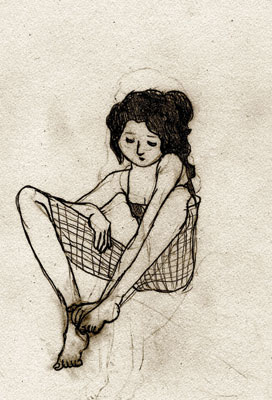All Nonfiction
- Bullying
- Books
- Academic
- Author Interviews
- Celebrity interviews
- College Articles
- College Essays
- Educator of the Year
- Heroes
- Interviews
- Memoir
- Personal Experience
- Sports
- Travel & Culture
All Opinions
- Bullying
- Current Events / Politics
- Discrimination
- Drugs / Alcohol / Smoking
- Entertainment / Celebrities
- Environment
- Love / Relationships
- Movies / Music / TV
- Pop Culture / Trends
- School / College
- Social Issues / Civics
- Spirituality / Religion
- Sports / Hobbies
All Hot Topics
- Bullying
- Community Service
- Environment
- Health
- Letters to the Editor
- Pride & Prejudice
- What Matters
- Back
Summer Guide
- Program Links
- Program Reviews
- Back
College Guide
- College Links
- College Reviews
- College Essays
- College Articles
- Back
Photoshop: An Unhealthy Image
For more than twenty years, the media has used Photoshop for photograph alteration and enhancement. Though the use of Photoshop is not always abused, the media occasionally uses Photoshop in negative ways, such as altering people unrealistically. The Photoshopped images in the media often impact the people who view the images in a negative, and occasionally dangerous, way. Photoshop should be banned from media use because it instigates unhealthy eating habits.
Exposure to Photoshopped images in the media makes people more likely to develop unhealthy eating habits. Often, these habits turn into eating disorders, which are “more than two times more prevalent in the United States than Alzheimer’s disease” (Rodenbough). Something to think about. Some people who see Photoshopped models in fashion magazines wish to look more like their extremely thin and unrealistic figures. Since the fashion industry seems to endorse extreme thinness, it can lead to the development of eating practices which “may manifest themselves as anorexia, bulimia, binge eating or other partial- or full-spectrum eating disorders” (Rodenbough). Why let Photoshop change people when people can change Photoshop? Additionally, children who see Photoshopped images of models tend to become less confident in themselves and want to change their bodies at a young age. A study done by Dove found that “42 percent of first- to third-grade girls want to be thinner, while 81 percent of 10-year-olds are afraid of getting fat” (Bennett) after exposure to images of Photoshopped models. Often, young girls resort to extreme changes in their diets to become happier with their bodies, which poses serious health risks for a child in their developmental stage. However, industries other than fashion use Photoshop that causes unhealthy eating habits in people. The food industry also uses Photoshop in their advertisements. When people see an advertisement or image of a Photoshopped burger or other unhealthy food, they are enticed to eat these foods in large amounts. This binge eating can lead to large and unhealthy weight gain. Research done by the American Heart Association found that “people who eat fast food twice a week and spend at least 2 hours a day watching television have triple the risk of obesity” (Kaufman) when compared to people who limit watching TV to an hour per day. Not every ad seen on TV includes Photoshopped images; however, when it comes to fast food, every food item shown is unrealistic. The advertisements people see for fattening fast food increase their intake of fast food, which causes health problems. After seeing such intriguing advertisements, who would not want to eat a big, juicy burger? When used to alter people or food, Photoshopped images in all industries have a large, often unhealthy impact on the people that view them.
Although significant evidence exists to prove that people who see Photoshopped models are more likely to develop eating disorders, many say that Photoshop is not used to create unrealistic definitions of beauty. In fact, Photoshop may not mainly be used to create a false body image in all cases. However, Ken Harris, who edits photos of models using Photoshop, admits, “‘all that is there to alter your mind, to alter your conception of what physical beauty is ... and what the means of attaining it are’” (Malkan). He continues to say, “‘in that the central point of retouching is to enforce an unrealizable standard of beauty, I suspect of myself some sort of covert obscure misogyny, because I'm really screwing with people's sense of identity and self-worth by doing this’” (Malkan). Since a professional who uses Photoshop admits that it is used to create unrealistic standards of beauty, clearly a serious problem exists.
Eliminating Photoshop from the media will help to decrease unhealthy eating habits. Adults and children will no longer compare themselves to unrealistic looking models, and they will not be as tempted to eat fatty fast food. Without Photoshop, people will improve their self-confidence and their plates. Banning Photoshop in every form of the media will lead to the healthy lifestyle that everyone wants to have.

Similar Articles
JOIN THE DISCUSSION
This article has 0 comments.
